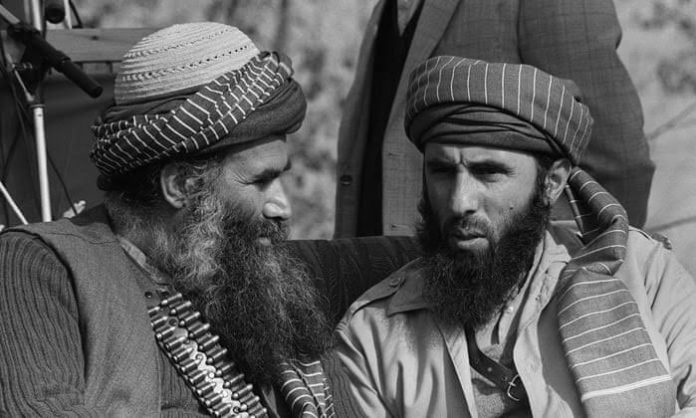The debacle of the US defeat and chaotic retreat in Afghanistan is a political disaster. But a stunning Taliban blitzkrieg followed more than 20 years of the US and allied policy failures, misunderstandings of Afghan politics and culture, public war fatigue and the culpability and corruption of the failed state’s leaders.
The US launched the Afghan war 20 years ago in a mood of vengeance, resolve and unity, after al Qaeda’s attacks on New York and Washington shattered the post-Cold War myth of American hyperpower. It is ending it in a rushed race to get out, humbled by a primitive militia, that is nevertheless ready to die for jihad on its home soil and is re-imposing its feudal writ on a war-ravaged nation that bleeds foreign invaders dry.
That a war that killed or maimed thousands of Americans, many more Afghan civilians and cost a trillion dollars, ended so abruptly with such an ignominious eclipse was shocking. But it perhaps should not have been.
When President Joe Biden declared on April 13, 2021 to withdraw American troops from Afghanistan by Sep. 11, 2021, anyone with some knowledge of the country knew that the Afghan government would not last long without American ground support.
Most of the US troops departed in July 2021. Since then, the Ashraf Ghani government’s control over Afghanistan has fallen like a pack of cards. That has led to severe criticism from both right and left of Biden’s decision to pull out from Afghanistan.
However, conservative commentators forget that Donald Trump had signed a peace agreement with the Taliban in February 2020 and had promised to withdraw troops by May 2021. Biden has not only followed that policy but has even extended the deadline by 130 days.
The criticism of the left and liberal circles is more surprising as they have been criticising the US military interventions in Afghanistan for the last 20 years, and now, blaming Biden for bringing an end to it. The defeat of the Afghanistan project of the US has been written on the wall since its beginning. If anything, President Biden has brought that long misery to an end.
After two decades, the US and its allies have not only been defeated in Afghanistan, but the Taliban has also become more powerful, resourceful, and even legitimate than what it was in 2001. Blaming Biden for withdrawing troops from Afghanistan or accusing Pakistan of its alleged support to the Taliban is unhelpful.
It will be rather prudent to introspect why a 20-year war, which cost the US nearly $2.3 trillion and sacrificed lives of more than 6000 of its troops and other personnel, has resulted in such a tragic end.
The US invasion of Afghanistan in 2001 was itself controversial. Anyone who understands Afghanistan’s history and ethno-religious character wouldn’t have put boots on the ground. Even if the US went in, it should have left Afghanistan in 2002 after dislodging the Taliban from power.
In 2002, the Taliban had been militarily defeated and was morally and diplomatically isolated. That would have been the right time to let Afghans run their country themselves and find a political system to accommodate the Taliban elements and concerns.
The US invaded Afghanistan based on its own security needs but decided to engage in an unrealistic state-building project in Afghanistan, as President Bush had proclaimed “a new era of human rights and human dignity.”
The lofty goal of creating a developed Afghanistan, where individual and group rights would be protected, and the rule of law would prevail, was a tall order to begin with. The hand-picked government by the US neither enjoyed legitimacy nor acceptance among the Afghans.
The development aid for Afghanistan increased from $1.3 billion in 2002 to $7.9 billion in 2018. Almost 80% of Afghanistan’s budget was being covered by foreign aid. Despite that, 34% of Afghans lived in poverty in 2007, increasing to 59% in 2017. Some growth in per capita income in the country has been primarily due to only some elites becoming extremely rich while the poor becoming poorer.
The corruption, not the Taliban, was the existential threat to the Afghan government. The world has witnessed now how corruption is playing its part in the abject surrender of provincial governors to the Taliban without even token resistance. The corruption, lack of professionalism, and fragmented ethnic loyalty have also led to the melting away of 300,000 strong ANDSF forces in front of 75,000 ragtag Taliban militants.
In the provinces, the Taliban had captured before this weekend, there’s strong evidence that the Taliban of today and the Taliban of 20 years ago are not much different. The Taliban of the past were infamous for denying education to women, carrying out public executions of their opponents, persecuting minorities, such as the Shiite Hazaras.
So far, in the areas of the country where they have regained control, the Taliban “have been executing people summarily, they have been lashing women, they have been shutting down schools. They have been blowing up hospitals and infrastructure,”
A Taliban-ruled Afghanistan might destabilize Pakistan
On the contrary, a large number of Pakistanis, including former military generals, politicians and segments of religious parties describe a Taliban victory as inevitable. Few among them are publicly cheering for one. But a collapse in Afghanistan would carry risks for Pakistan, too, including a possible wave of refugees, and a boost to jihadist movements that target Pakistan’s government for attack.
Pakistan’s establishment, in particular, has long viewed an ideologically and religiously like-minded Afghanistan as a necessary bulwark against its traditional rival, India. But Pakistan’s long, porous border with Afghanistan has brought it as much trouble as brotherhood: For years, Pakistan housed tens of thousands of Afghan refugees in border camps placing a financial and political strain on a succession of shaky governments in Islamabad.
The Taliban in Afghanistan helped inspire the deadly Tehrik-i-Taliban Pakistan, more commonly known simply as the Pakistani Taliban. The leaders of the two groups are reportedly at odds and don’t share common goals. Even so, “if there is a Taliban government in Afghanistan, certainly that’s going to embolden the ,” Islamist extremism has already divided Pakistani society along sectarian lines, and the ascendance of Afghan Islamists next door will only embolden radicals at home.
Moreover, Pakistan’s delusional establishment has to realize that “You can’t keep snakes in your backyard and expect them only to bite your neighbors. You know, eventually those snakes are going to turn on whoever has them in the backyard.” History is repeating itself, Pakistan has to be vigilant and should not repeat the callous mistake of aligning with the Taliban because the consequences would be catastrophic.
However, in view of the humanitarian situation in Afghanistan, the USA and the developed world owe them special immigrant visas. The world owes common Afghan nationals safety, every bit as much as we owe safety to our citizens, we owe the same to Afghans.








